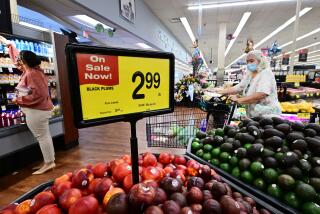Consumer Debt Increases by $4.46 Billion in March
- Share via
WASHINGTON — Americans took out $4.46 billion more in installment credit than they paid off in March, the fourth consecutive strong monthly increase, the government said Friday.
The March gain in consumer debt was down from a $5.04 billion increase in February, but still represented an annual rate of gain of 8.6%, the Federal Reserve said.
For the first three months of the year, consumer borrowing increased at a 10.3% annual rate, compared to 7.2% all of last year.
However, analysts said rising interest rates and weak wage increases likely would slow consumer borrowing in the months ahead.
Sandra Shaber, an economist with the Futures Group, a Washington forecasting firm, attributed the growth to strong pre-Easter spending in March and to a relatively high level of auto sales.
The credit report said car loans increased $3.21 billion in March, a 14.1% annual growth rate, compared to a 14.5% rate in February.
The category that includes credit card debt grew $2.22 billion, a strong 16.3% growth rate, which followed a gain at a 10.3% rate in February.
The growth was offset by declines in borrowing to purchase mobile homes and in the category including loans from banks and credit unions not secured by real estate.
Non-real estate loans fell by $796 million, a drop at a 5.4% annual rate, after rising at a 3.4% rate in February and a 6.0% rate in January.
Shaber said the evidence of strong consumer spending in March, coupled with a drop in the civilian unemployment rate in April to 5.4%, the lowest since 1974, may increase fears that inflation will heat up.
However, she said that she expected growth in consumer spending to slow in the months ahead because salary and wage increases have been weak.
“My feeling is people will overstate what this means. . . . Car sales weakened a bit in April and department store sales were terrible,” she said.
“Consumer credit is not going to be growing in the months ahead as it did in the first quarter. . . . A lot of people are working, but on a per-worker basis, wages and salaries are not keeping up with inflation.”
She said consumer spending, which accounts for about two-thirds of the nation’s economy, would likely grow by 2% this year, similar to the 1.9% growth last year, but only about half of the growth rate earlier in the expansion.
Analysts say rising interest rates, by boosting the cost of credit purchases, are likely to dampen spending.
The Federal Home Loan Mortgage Corp. said Friday that fixed-rate mortgages rose in the current week to 10.32%, up from 10.28% a week earlier.
More to Read
Inside the business of entertainment
The Wide Shot brings you news, analysis and insights on everything from streaming wars to production — and what it all means for the future.
You may occasionally receive promotional content from the Los Angeles Times.










